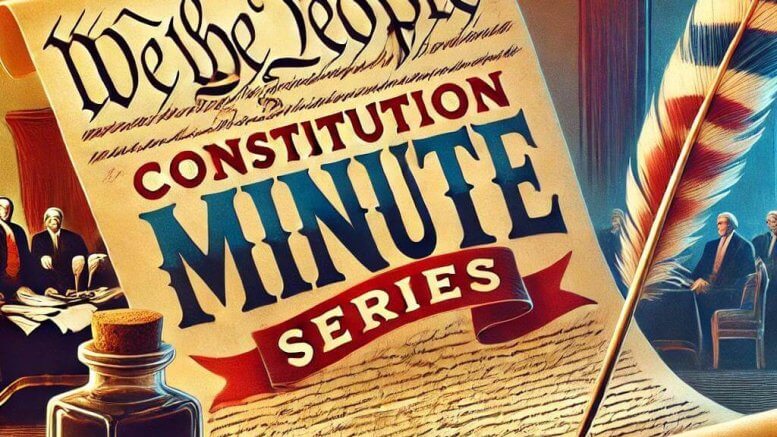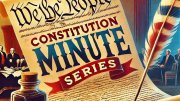As the United States gears up for the upcoming 2024 presidential election, with intense debates and legal battles surrounding candidates like Joe Biden and Donald Trump, the foundational principles of our democracy are more relevant than ever. Enter the Federalist Papers.
The Federalist Papers is a collection of 85 articles and essays written by Alexander Hamilton, James Madison, and John Jay under the collective pseudonym “Publius” to promote the ratification of the Constitution of the United States. These essays were instrumental in shaping the Constitution and persuading the states to ratify it.
In this Constitution Minute, we will explore how the Federalist Papers influenced the ratification of the U.S. Constitution and continue to inform our understanding of its principles.
Historical Context and Purpose of the Federalist Papers
The Federalist Papers were written between 1787 and 1788 to support the ratification of the U.S. Constitution. The authors aimed to explain and defend the proposed Constitution to the public. They addressed concerns and opposition from the Anti-Federalists. These essays were published in various New York newspapers under the pseudonym “Publius.”
The United States was governed by the Articles of Confederation at the time. These articles had proven ineffective in providing a strong central government. The Constitutional Convention of 1787 proposed a new framework to replace the Articles. However, the proposal faced significant opposition. The Federalist Papers played a crucial role in garnering support for the new Constitution by addressing the concerns of skeptics and illustrating the benefits of a stronger union.
Key Themes and Arguments
The Federalist Papers addressed several key themes. These included the necessity of a strong central government, the importance of checks and balances, and the need for a separation of powers. For example, in Federalist No. 10, James Madison discussed the dangers of factionalism. He explained how a large republic could mitigate these risks better than smaller governments. He argued that a well-constructed union would break and control the violence of faction, a common issue in direct democracies and small republics.
In Federalist No. 51, Madison elaborated on the importance of checks and balances. He asserted that each branch of government must be independent and have sufficient power to check the others. This principle was vital to prevent any one branch from dominating and potentially abusing its power.
The Federalist Papers Influence on the Constitution
The arguments in the Federalist Papers were crucial in shaping the debate over the Constitution’s ratification. They provided a comprehensive defense of the new government framework and helped clarify the intentions behind various provisions. The essays emphasized the importance of a strong union, the dangers of weak confederacies, and the need for a balanced government structure.
For instance, Federalist No. 78, written by Alexander Hamilton, laid the foundation for the role of the judiciary. Hamilton argued for an independent judiciary with the power of judicial review, which ensured that the courts could act as a check on the other branches of government. This essay has been frequently cited in Supreme Court decisions. It remains a foundational text for understanding the judicial branch’s role in the American government.
Continuing Relevance
The Federalist Papers remain relevant today as they offer valuable insights into the framers’ intentions and the principles underlying the Constitution. They are frequently cited in legal arguments, judicial opinions, and scholarly works. This helps to interpret the Constitution’s meaning and application in modern contexts. Legal scholars and judges, including those on the Supreme Court, often refer to these essays to better understand the original intent behind the Constitution’s provisions.
For example, Chief Justice John Roberts has cited The Federalist Papers in his opinions. He emphasizes their importance in understanding the Constitution’s structure and purpose. Similarly, legal scholars use these essays to argue for and against various interpretations of constitutional law, making them a living part of America’s legal and political discourse.
The Virginia Christian Alliance, dedicated to promoting moral, social, and scientific issues from a Biblical perspective, also recognizes the importance of understanding foundational documents like the Federalist Papers. This helps to uphold the principles that underpin American society.
Conclusion
The Federalist Papers played a vital role in ratifying the U.S. Constitution. They continue to be an essential resource for understanding its principles. By exploring these essays, we gain a deeper appreciation of the Constitution’s foundation and the enduring wisdom of its framers. Their insights into the necessity of a strong union, the dangers of factionalism, and the importance of checks and balances remain relevant in guiding our democratic processes today.
Call to Action
Stay tuned for more insights in our Constitution Minute series, where we’ll continue our focus into the key principles and amendments that shape our nation. Share your thoughts and questions in the comments below!
References
- Alexander Hamilton, Federalist No. 78. Available at Founders Online on the powers of judicial review.
- “Federalist Papers,” Library of Congress. Available at loc.gov.
- John Roberts, “Supreme Court Opinions,” Supreme Court of the United States. Available at supremecourt.gov.





